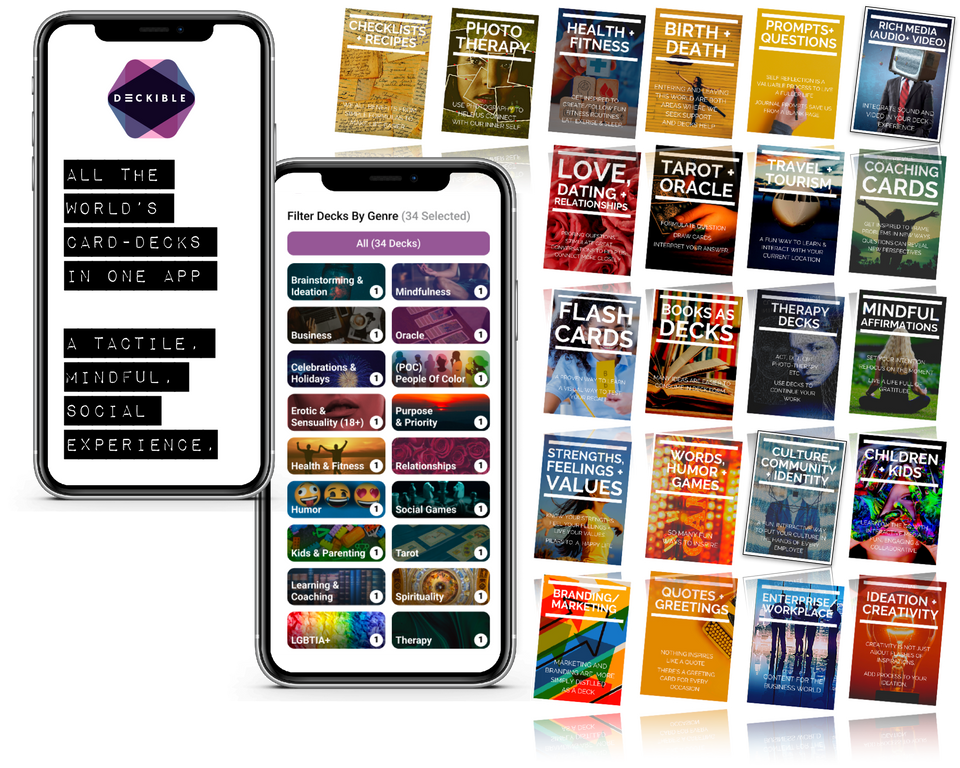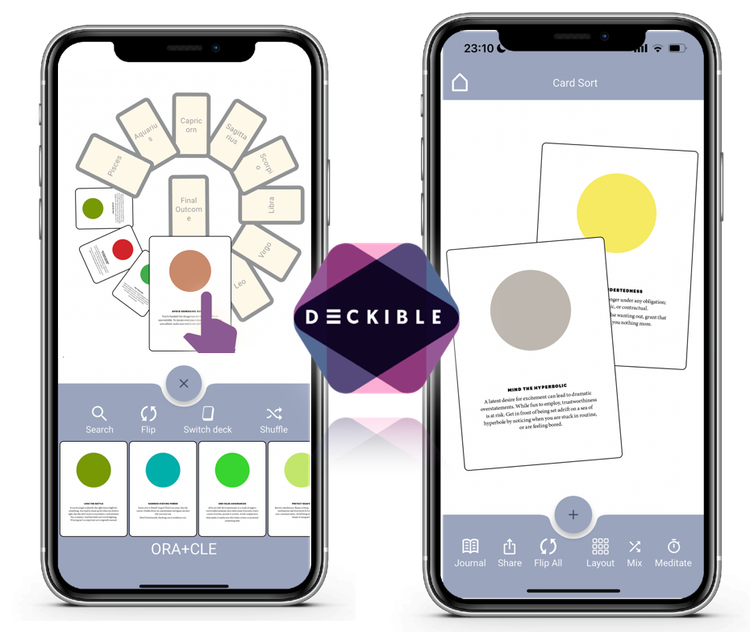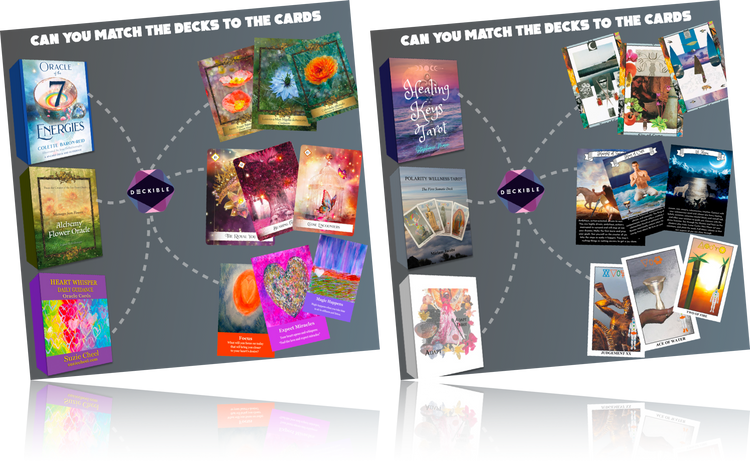Digital Card Deck Platforms: Help Monetize your Card Decks

Why should you use a Digital Card Deck Platform like Deckible?
Digital Card Deck platforms let you carry a library of decks on your phone. Decks from all sorts of genres. Digital Card Deck platforms let you benefit from the form factor of Card Decks.
A digital card deck platforms are an online tool or application that allows users to create, share, and use digital card decks. Digital card decks are collections of virtual cards that can contain text, images, audio, or video content.
Audible is platform for audio books. Kindle is platform for ebooks.
Digital Card Deck platforms simply offer a card deck experience on the phone for a broad range of card deck from many authors across many domains. Platforms like Deckible offer a parallel experience to Audible and Kindle.
Digital card deck platforms also let you combine cards from multiple decks offering greater inspiration and randomization.
Digital card deck platforms can be used for a variety of purposes, such as educational or training purposes, gaming, personal development, or entertainment.
Digital card deck platforms allow users to collaborate with others, share their decks publicly or privately, and even sell them. These platforms may also include features such as deck analytics, progress tracking, and gamification elements to enhance user engagement.

Types of Card Decks on Digital Card Deck Platforms
There are countless types of card decks available today, as cards can be used for a wide range of purposes, including gaming, education, personal development, and more.
Here are some examples of popular types of card decks:
- Tarot cards are a type of divination tool that has been used for centuries to gain insight into the past, present, and future. The tarot deck consists of 78 cards, divided into two main groups: the Major Arcana (22 cards) and the Minor Arcana (56 cards). Each card in the tarot deck features a symbolic image, often with a corresponding name. Cards used for divination and fortune-telling.
- Oracle cards are a type of divination tool used for gaining insights, guidance, and inspiration. They are similar to tarot cards, but unlike tarot cards, oracle cards do not have a fixed set of rules or meanings associated with them. Instead, they feature various images, symbols, and messages that are open to interpretation. Oracle cards can be used for a variety of purposes, including personal growth, spiritual development, and divination. They can help people gain clarity and insight into their lives, make important decisions, and connect with their intuition and higher self.
- Flashcards - a deck of cards used for studying and memorization, often featuring a question on one side and the answer on the other.
- Educational cards - a deck of cards designed to help students learn and memorize information in various subjects, such as math, science, or language.
- Affirmation cards are a type of card deck designed to promote positive thinking, self-care, and personal growth. They typically contain a set of cards, each featuring a positive affirmation or motivational message. Affirmations are positive statements that can help individuals reframe their thoughts and beliefs, reduce stress, and cultivate a more positive outlook on life. Affirmation cards often feature colorful images or artwork, along with the affirmation text.
- Therapy cards, (or counseling cards) , are used in psychotherapy, counseling, and personal development. They are designed to help individuals explore their emotions, thoughts, and behaviours, and promote self-reflection and insight. Prompts or questions related to specific topics, such as anxiety, depression, self-esteem, relationships, or trauma.
- Value decks are a type of card deck used in personal and professional development to help individuals explore and define their personal values. Values are the beliefs and principles that guide our behavior and decisions, and understanding our values can help us make choices that align with our authentic selves. A value deck typically contains a set of cards, each representing a different value. The cards may include a definition or description of the value, along with prompts or questions to help individuals reflect on how the value applies to their lives.
- Emotions decks are a type of card deck used to help individuals explore and understand their emotions. Emotions are complex experiences that can be difficult to articulate, and an emotions deck can provide a framework for individuals to better identify, express, and regulate their emotions. An emotions deck typically contains a set of cards, each representing a different emotion. The cards may include a description or definition of the emotion, along with prompts or questions to help individuals reflect on how the emotion feels in their body, what triggers the emotion, and how to respond to it in a healthy way.
These are just a few examples, but the possibilities for card decks on digital card deck platforms are endless.
Benefits of Digital card deck platforms
With the rise of digital card deck platforms, more and more custom card decks are being created every day. Digital card deck platforms offer several benefits over traditional printed card decks, including:
- Portability: Digital card decks can be accessed from a smartphone or tablet, making them easy to carry and use on-the-go.
- Customization: Digital card decks can be easily customized and personalized, allowing individuals to tailor the content to their specific needs and preferences.
- Interactivity: Digital card decks often include interactive features, such as animations, sounds, or videos, which can enhance the user experience and engagement.
- Accessibility: Digital card decks can be designed to be accessible to people with different abilities, such as individuals with visual impairments who may benefit from audio descriptions or text-to-speech technology.
- Cost-effective: Digital card decks can be more cost-effective than printed card decks, as there are no printing or shipping costs involved.
- Sustainability: Digital card decks are more environmentally sustainable than printed card decks, as they do not require paper or other physical materials. Also digital card decks offer as saving in waiting for the deck to arrive and to save the cost of shipping.
- Social Sharing: Digital card deck platforms also make it much easier to share cards or collections of cards.
- Promotional Tool: Digital card deck platforms help you sell more copies of you physical deck. Alternatively they let you go digital only or digital first. Digital card deck platforms also let you iterate on your deck content, and hence create a better product.
Overall, digital card deck platforms can provide a convenient and engaging way for individuals to access and benefit from the content of card decks, whether for personal or professional development.


